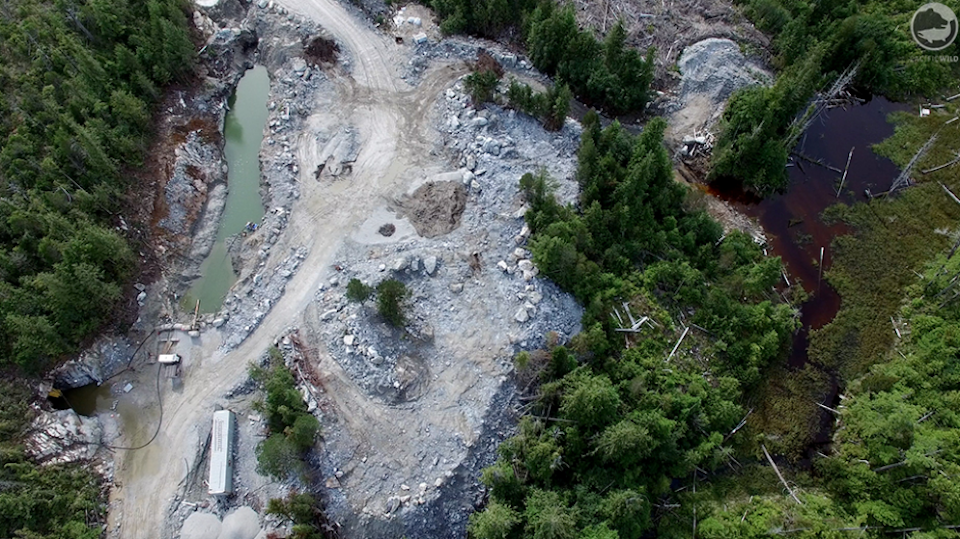The B.C. government is putting all mining and mineral exploration and permitting activity on hold in two regions of B.C., pending an overhaul of the Mineral Tenure Act.
It’s the kind of move that has the potential to put a chill on mineral exploration in B.C., due to the uncertainty it may create, although the two areas of B.C. where activity and permitting is being temporarily “paused” are not exactly hotbeds for mining or mineral exploration.
The B.C. government today announced orders that will pause mineral exploration and permitting in Gitxaala territory, which is on the northwest coast, centred around Kitkatla south of Prince Rupert, and Ehattesaht territory on Northwest Vancouver Island, between Nootka Sound and Kyuquot.
The activity will be paused, though it appears there would be provisions that would allow exploration activity, if the First Nations give consent.
“The orders pause the limited current mining activities as well as the issuance of new permits in Gitxaała and Ehattesaht territories and prevent the registration of new mineral claims without agreement by the respective nations,” the government said in a press release.
The temporary orders are being made to avoid any further legal battles over the issue of mineral claims being granted without First Nation knowledge or consent while the province overhauls the Mineral Tenure Act to achieve a more permanent solution.
The Gitxaala’s concerns over the way mineral claims are filed arose after a small gold mine on Banks Island left behind an environmental mess. The Gitxaala went to court to challenge the way mineral claims are granted in B.C., and were joined in their court challenge by the Ehattesaht.
Anyone who wishes to go do exploratory work in the hunt for metals, minerals and gems can file a mineral claim without anyone but the government being aware.
There’s a reason for this. Prospectors only file claims for areas where they suspect the geology may be conducive to hosting certain mineral deposits, and don’t want to tip their hand, lest others follow their lead.
The Gixtaala and Ehattesaht say they should be made aware of claims being granted in their traditional territories that could lead to resource extraction.
The two First Nations sought an injunction against any further claims being granted without their consent, and also asked that several claims that had already been issued be quashed. They also sought a declaration that the Mineral Tenure Act was inconsistent with the Declaration on the Rights of Indigenous Peoples (DRIPA).
BC Supreme Court Justice Alan Ross last year agreed the province has a duty to consult First Nations even at the earliest stages of mineral exploration – the filing of a claim – but declined to grant the injunctions sought or quash claims already issued.
He gave the provincial government 18 months to resolve conflicts between the Mineral Tenure Act, Canadian laws governing the duty to consult, and DRIPA.
Unsatisfied with the ruling, the Gitxaala and Ehattesaht appealed. They are now suspending their appeals, after reaching an agreement with the province, which has agreed to halt all mineral exploration activity in their traditional territories.
"These interim measures mean that instead of ongoing litigation that could have far more significant and longer-term impacts to the sector, we are instead able to focus on our work together to reform the act, providing greater certainty to First Nations, industry and British Columbians,” said Josie Osborne, minister of Energy, Mines and Low Carbon Innovation.
The Mining Association of BC (MABC) said it supports the work currently underway to “modernize” the Mineral Tenure Act.
“MABC and our members strongly support a modernized MTA that fulfills the Crown’s duty to consult First Nations, maintains investor confidence in BC, and advances economic reconciliation, First Nations partnerships, and shared prosperity through the development of BC’s critical mineral resources,” MABC president Michael Goehring said.
The Association of Mineral Exploration (AME) appears to be a bit more concerned over the Mineral Tenure Act modernization process.
“AME continues to seek transparency, certainty and clarity on the Mineral Tenure Act (MTA) modernization process,” the association said in a news release.
“Industry must play a more significant role in this process as a tenuring system that protects the intellectual property of our members and ensures their ability to explore is at the crux of our members’ interests.”




